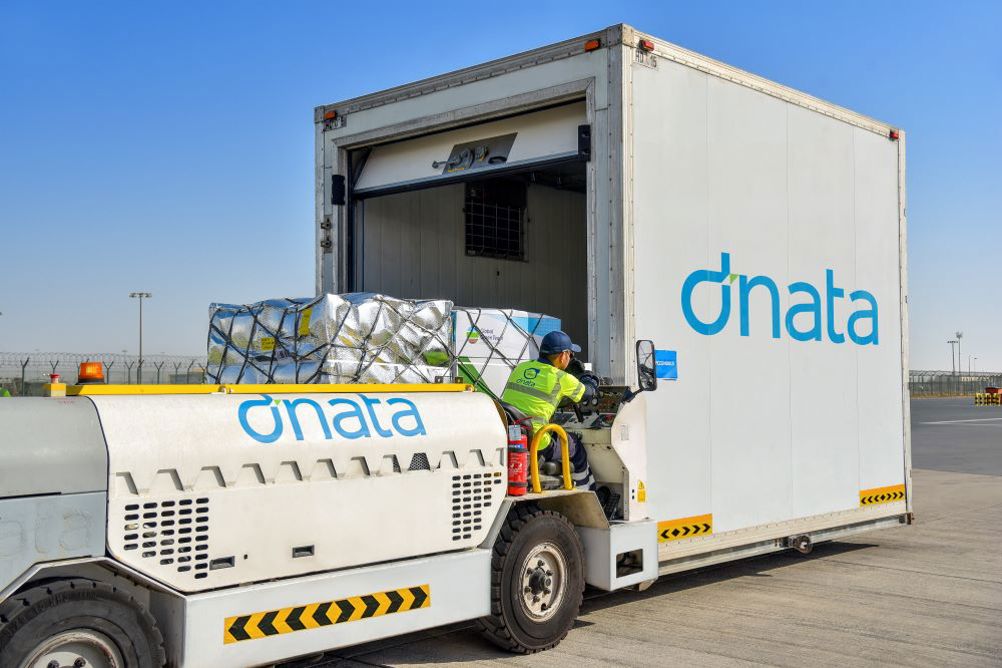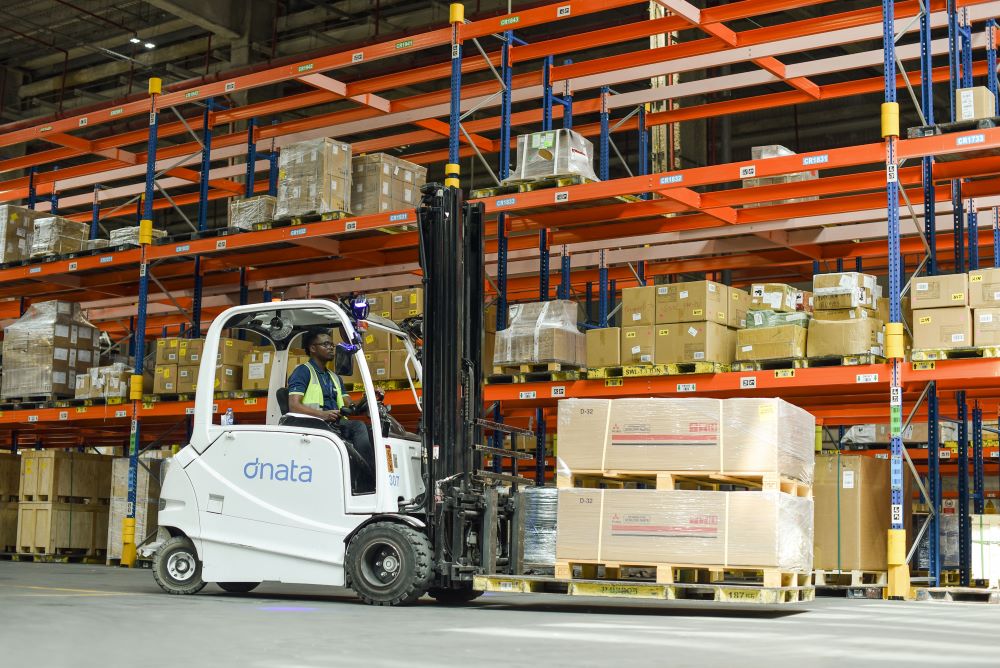
For over 60 years, dnata has been a global leader in ground handling and cargo services, consistently setting the standard for excellence in the industry.
Situated aptly outside Dubai International Airport (DXB), dnata’s massive headquarters in Dubai serve as a powerful reminder of the strong connection between the company and the world’s second busiest airport and their seamless integration driving global operations — an integration that continues to evolve at great speed.
The last financial year alone proved to be exceptional for dnata, as it marked a record year for the business, handling more than one million tonnes of cargo in Dubai, its highest-ever volume in a single year.
The milestone represented a 30% year-on-year increase, and further solidified dnata’s position as a leading global air cargo player.
Worldwide dnata handles approximately 3.1 million tonnes of cargo per year, and in Dubai alone serves more than 120 airline customers at DXB and Al Maktoum – Dubai World Central (DWC) airports, handling cargo as wide-ranging as perishables, pharmaceuticals, dangerous goods, live animals, aircraft engines and vehicles.
On the passenger side, dnata serves over 90 million passengers annually in Dubai, and is playing an integral role in the design of the new Al Maktoum airport, which will open by 2035.
The airport will be the largest in the world, tripling its capacity to handling 260 million passengers per year and 12 million tonnes of cargo.
“Dubai’s growth as a global hub continues to thrive, even amid today’s complex geopolitical and economic environment,” said dnata Group CEO Steve Allen.
“Despite these turbulent times, we have seen a 30% surge in cargo volumes. It’s clear evidence that the city remains a resilient global hub, undeterred by global unrest.”
Infrastructure investments
dnata’s diverse global footprint, bolstered by recent cargo infrastructure investments exceeding US$110 million in Amsterdam, Erbil and Dubai South, helps the company remain resilient in these challenging times.
In July, dnata will open two cargo facilities: a 61,000 square-metre fully-automated cargo centre at dnata Cargo City Amsterdam at Schiphol Airport, with a capacity of handling more than 850,000 tonnes of cargo annually and a 20,000 square-metre cargo facility in Erbil, which will be able to process 66,000 tonnes per year — a 300% increase.
By the end of 2025, dnata Logistics will also have completed its 57,000 square-metre cargo centre at Dubai South, with a capacity to handle up to 400,000 tonnes of cargo annually.
“Cargo is a core pillar of our global growth strategy, and we’re expanding our footprint with a firm eye on sustainability,” explained Allen.
“There is a huge potential across key verticals such as pharmaceuticals, fast-moving consumer goods and e-commerce. E-commerce, in particular, is a game changer. Customers now expect delivery within hours, not days, and that shift is driving fundamental change in how we operate. The cargo sector must adapt to a faster, more dynamic flow of goods, while bulk transportation remains the domain of the shipping sector.
“As demand grows, cargo facilities are evolving rapidly. Warehouses have moved far beyond traditional storage spaces. They are smart, digital environments where automation, robotics and real-time data play a central role in improving speed, accuracy, and efficiency. Our investments reflect this evolution, ensuring we stay ahead of the curve while continuing to meet our environmental commitments.”
In addition to further investments at DWC, next summer dnata will open a Cargo Express facility at DXB, designed specifically to handle e-commerce, allowing the company to further optimise its existing infrastructure.
Interestingly, dnata has also seen significant growth in sea-to-air cargo, which reflects the growing importance of intermodal transport.
“Much of this growth is driven by DWC’s strategic road connection to the Port of Jebel Ali. That seamless link has made it easier and faster to move goods arriving by sea directly into the air cargo network, increasing efficiency and speed to market,” said Allen.
“The shift to intermodal transportation has been crucial, and we’ve invested significant time and effort into digitising the entire process. We’re building fully connected networks that integrate sea, air, and rail, allowing us to respond faster to customer needs and market shifts.”

Impact of tariffs
On the subject of Donald Trump’s trade tariffs, Allen says that it’s too early to say what impact they will have on the industry but stresses that dnata is well-positioned to overcome any challenge.
“While President Trump has outlined a clear negotiating stance, it’s still uncertain where it will ultimately lead. What’s evident is that change is coming. Measures of this scale suggest significant shifts ahead — particularly in terms of deglobalisation and a move toward more domestic production in certain markets, which could influence trade flows. The full extent of those changes, however, remains unclear,” said Allen.
“Customer expectations aren’t changing. They continue to demand speed, reliability and global access to high quality goods, including vital pharmaceuticals and fresh perishables. While trade flows may adjust due to policy shifts or tariffs, the underlying demand remains strong.
“We may see an increase in domestic trade within key markets and a possible decline in some cross-border flows — such as between Canada and the US. However, that could be offset by increased trade from Canada to Europe, Asia, and other global destinations. Trade routes will continue to evolve, as they always have, in response to changing policies and economic conditions.
“For now, we’re taking a considered approach, avoiding premature conclusions while closely monitoring how the landscape develops. At the same time, we remain resilient. With a truly global presence, we’re well positioned to adapt to shifting trade patterns. We’ve successfully navigated complex transitions before. After Brexit, for example, we adapted our operations to meet new requirements and continued to grow. Our strong cargo presence, particularly at Heathrow, has played an important role in strengthening our position across Europe,” he said.
Sustainability goals
Allen says that dnata is making significant progress in reducing its carbon footprint by 50% by 2030, but acknowledges that achieving sustainability in the air cargo industry isn’t always straightforward and needs to become reality through effective regulation.
dnata’s cargo terminals adhere to the highest green standards.
For example, dnata City North at Manchester airport and dnata City East at Heathrow are both BREEAM certified.
The Lahore facility in Pakistan holds LEED certification, and the cargo warehouse in Erbil is currently progressing toward the same.
dnata is also investing significantly in electric ground support equipment and alternative fuels, such as HVO.
In the Netherlands, over 65% of its fleet is now powered by electricity or solar energy.
In addition, it recently transitioned its entire non-electric fleet to biodiesel across the two Dubai airports.
“In some markets, sustainability is no longer optional — it’s embedded in regulation. That’s particularly true in countries like the Netherlands and Australia, where governments are driving sustainable practices and setting clear expectations for businesses,” explained Allen.
“Regulation often prompts action — and in many cases, it helps move the needle in industries like ground handling and cargo, where progress has traditionally been harder to achieve.
“Sustainability in our industry isn’t always straightforward. We are actively rolling out electric GSE across our network. However, to make them work, we also need the right infrastructure, including charging stations, plug-in access, and a robust power grid capable of supporting high-voltage equipment. And not every airport is there yet.
“Every time we build or invest, we prioritise sustainable options. Our goal is clear: to reduce our carbon footprint by 50% by 2030. It’s ambitious, but essential — and we’re making steady, measurable progress toward that target every day.”
Outlook ahead
Allen says that this year will be just as challenging as any other year, which isn’t anything new for the industry.
“Our industry is no stranger to disruption, from Brexit to post-pandemic staff shortages to the current shifts in global trade. It’s what makes the sector so dynamic and keeps us sharp. We’ve weathered every storm, adapted and emerged stronger each time. That resilience is what drives us,” he added.
This article was published in the June/July 2025 issue of Air Logistics International, click here to read the digital edition and click here to subscribe.
